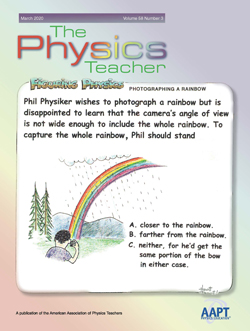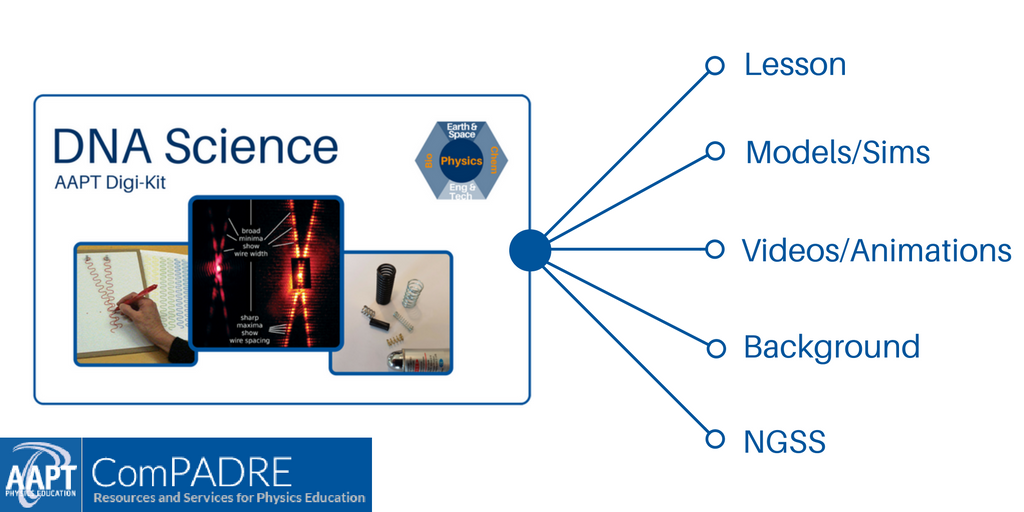The Physics Teacher
Volume 58 Issue 3, March 2020
Celebrating 34+ years of Paul Hewitt’s “Figuring Physics”
This month's cover poses a classic rainbow conundrum, and celebrates more than three decades of wonderfully compelling “Figuring Physics” cartoons from well-known physics educator Paul Hewitt. For more about rainbows in this issue, see Ken Ford's article “Rainbows: A graphical approach” and Jennifer and Ignacio Birriel’s paper “Rearview mirror rainbow: An optics investigation”. For details about the origins of the “Figuring Physics” series, see Celebrating 34+ years of Paul Hewitt's "Figuring Physics", but if you want to see the solution to the cover conundrum in print, you’ll have to wait until next month!.
Columns
And the Survey Says..., Figuring Physics, iPhysicsLabs Little Gems , Physics Challenge for Teachers and Students, Fermi Questions, Talkin' Physics, and Websights.
Papers
Photoelectric effects by Conrad Schiff. DOI: /10.1119/1.5145396
Starfish in the sky by Tom Greenslade Jr.. DOI: /10.1119/1.5145397
Improved demo of granular flow by Said Shakerin. DOI: 10.1119/1.5145398
Breathtaking Physics: Human Respiration as a Heat Engine by Trevor C. Lipscombe and Carl E. Mungan. DOI: 10.1119/1.5145400
Rainbows: A Graphical Approach by Kenneth W. Ford. DOI: 10.1119/1.5145401
A Case Studies Approach to Teaching Introductory Physics by Gregory A. DiLisi, Alison Chaney, Stella McLean and Richard Rarick. DOI: 10.1119/1.5145402
Speed Eleusis: Variation on an Old Educational Card Game by John R. Walkup and Roger Key. DOI: 10.1119/1.5145403
Rearview Mirror Rainbow: An Optics Investigation by Jennifer Birriel and Ignacio Birriel. DOI: 10.1119/1.5145405
Duhdohnium: A Dice Game to Introduce Middle and High School Students to Non-elementary Systems by Andrea Bussani. DOI: 10.1119/1.5145406
Video-Based Analysis of the Transition from Slipping to Rolling by Álvaro Suárez, Daniel Baccino and Arturo C. Martí. DOI: 10.1119/1.5145407
Dynamics of a Spool-Block Atwood System by Abdallah El Idrissi, Dominic Calabrese and Tyler Hickox. DOI: 10.1119/1.5145408
Measuring the Coefficient of Kinetic Friction by Exploring Dynamics of Rotational Motion by Robert Drosd and Leonid Minkin. DOI: 10.1119/1.5145409
Helmholtz Resonator in Laboratory Experiments by Mária Koval’aková, Mária Kladivová and Zuzana Gibová. DOI: 10.1119/1.5145410
Linear Quadrupole Magnetic Field Measured with a Smartphone by Enrique Arribas, Isabel Escobar, Raquel Ramirez-Vazquez, Carmen del Pilar Suarez Rodriguez, Jesus Gonzalez-Rubio and Augusto Belendez. DOI: 10.1119/1.5145411
Teaching Thermodynamics Using a Vacuum Container for Food by Yasuo Ogawara. DOI: 10.1119/1.5145412
A Measurement of Gravitational Acceleration Using a Metal Ball, a Ruler, and a Smartphone by J. Kim, L. Bouman, F. Cayruth, C. Elliott, B. Francis, E. Gogo, C. Hyman, A. Marshall, J. Masters, W. Olano, A. Paone, K. Patel, L. Richards, C. Sbardella, A. Snider, B. Trinh, F. Umari and H. Wilks. DOI: 10.1119/1.5145414
Systematic Errors in Video Analysis by Tim Martin, Kayt Frisch and John Zwart. DOI: 10.1119/1.5145415
A Slinky’s Elastic Potential Energy by Philip Gash. DOI: 10.1119/1.5145416
Charged Particle Pickup Tube Detector Used in Experimental Applications and Classroom Demonstrations by Robert R. Nerem and David James. DOI: 10.1119/1.5145417
Double Ring Stand Interference by Michael Scott Bell. DOI: 10.1119/1.5145418
Teaching Doppler Ultrasound in an Introductory Laboratory for Pre-health Students by Theodore Stenmark, Thomas Allen and Ralf Widenhorn. DOI: 10.1119/1.5145419
Model Comparison in the Introductory Physics Laboratory by Brian S. Blais. DOI: 10.1119/1.5145420
Race and Physics Teaching Collection Resource
DNA Science Lesson & Digi-Kit
Inspired by an article from The Physics Teacher, this multidisciplinary lesson and digital resource collection is based on How Rosalind Franklin Discovered the Helical Structure of DNA: Experiments in Diffraction (Braun, Tierney, & Schmitzer, 2011). Click the image to access this resource.



